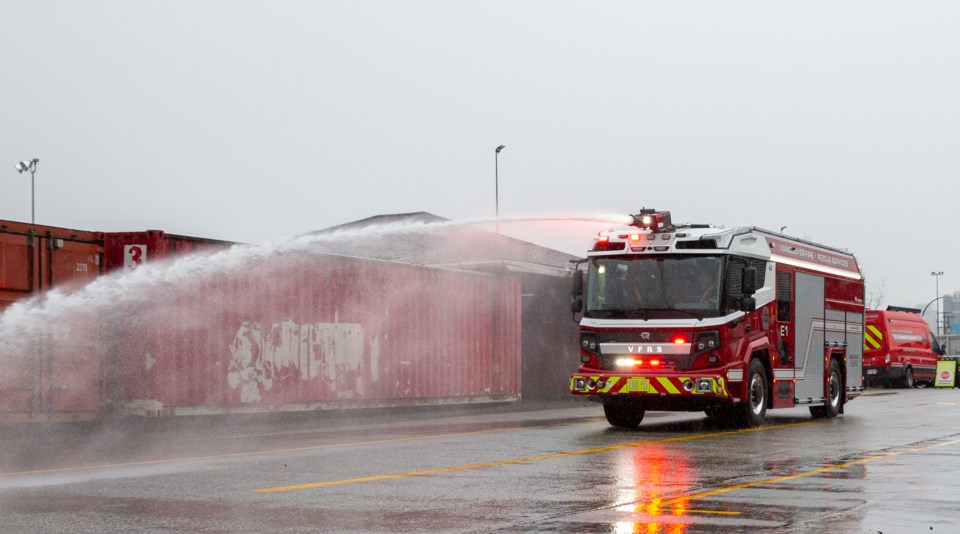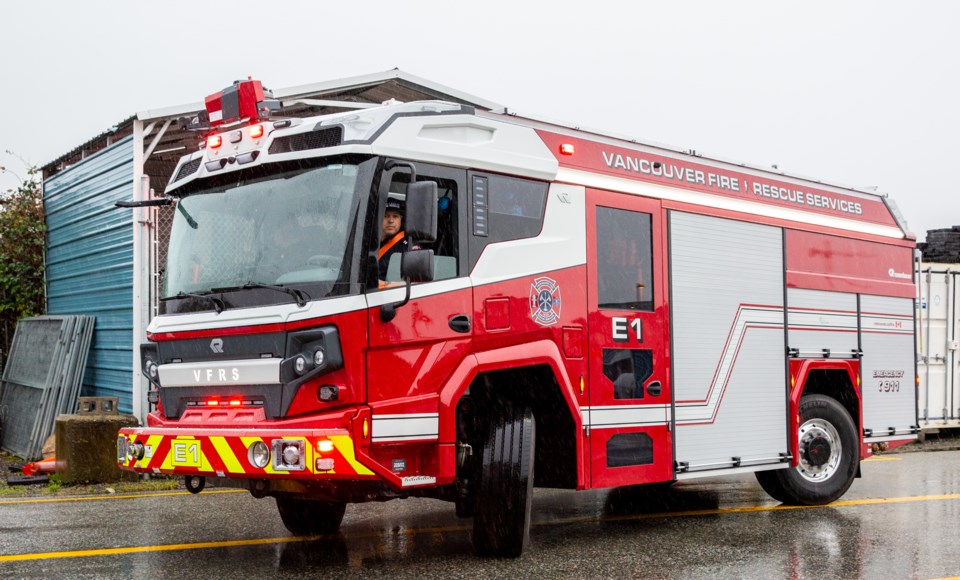The Vancouver fire department’s electric fire truck — the first of its kind in sa国际传媒 — has been sidelined with a water leak since early January and is not expected to be back in service until sometime in April.
The $1.8-million Rosenbauer RTX pumper truck was unveiled Dec. 4, 2023 but was taken off the road in the first week of January after its 500-gallon water tank sprung a leak.
Assistant Chief Ryan Hayes of Vancouver Fire Rescue Services said the leak had nothing to do with the truck being electric, noting the department has had tanks leak on gas-powered fire trucks.
“But we're very well aware that there's obviously a microscope on this truck, so any tiny problem is absolutely going to be amplified,” said Hayes, who oversees the department’s fleet and equipment services.
“The tank ruptured, which created depressurization of the tank itself, so it couldn't hold any water.”
Hayes said the leak did not damage any of the truck’s electronics or electric drive train, which is powered by two large Volvo-Penta batteries, with one directly behind the cab and the other between the front and rear axles.
The truck was transported to Rosenbauer’s Minnesota factory, where the tank has since been replaced. The truck is under a five-year warranty and remains in Minnesota, where the company is also making some minor modifications to the vehicle, as suggested by firefighters.
Those modifications include adding some additional storage and rearranging shelves to make it easier for firefighters to access equipment such as medical gloves.
“Moving something like that to another compartment, it sounds very innocuous, but there's a lot of stuff that goes along with it because other shelving and rollout trays and things have to be moved to accommodate that,” Hayes said.
Truck in Minnesota
Todd McBride, sales and marketing manager for RTX, said the company could have repaired the tank while the truck was in Vancouver but decided to outfit the vehicle with a new one, which required the trip to Minnesota.
“Maybe it’s not a good analogy, but if you buy a brand new car on the lot and in the first few months you blow the engine, and the dealer comes back and says, ‘Oh, we're just going to repair the engine,’ it doesn't give you the best feeling,” McBride said.
“So we made the decision that it's better to replace the tank and that way we know what we’ve got.”
McBride said the company knows exactly how the rupture happened.
“To the average person, unless you really know how these things are plumbed, it's going to be hard to understand,” he said.
“But basically, a series of events that happened in perfect sequence caused the leak…the main goal is that it doesn't happen again to Vancouver, or to any of the other trucks that are in service.”

'Like a custom-built house'
McBride said the company has approximately 60 electric trucks that are being built, sold or in service, including one in Los Angeles. That department also reported a leaking water tank during training, he said.
“I would say both events were due to an overpressurization in the water tank, but the circumstances leading up to them were different,” he said, adding that he anticipated Vancouver’s truck would be returned to the department before the end of April.
Having to make repairs and modifications on a new vehicle, he said, is not common but also not unexpected when considering what goes into building a “complex” truck tailored to each fire department.
"I've been in this industry for 19 years," McBride said.
"Most of these apparatus, whether they're a pumper like this, or an aerial, they are complex. They're custom trucks and built to meet the requirements of the individual fire department. So it's not like 100 [Ford] F150s rolling off the production line where they're all the same. These are like a custom-built house, and so each one is different.”
Electric truck 'naysayers'
The fire department is currently using a gas-powered pumper truck to run out of its main hall in Strathcona, where the electric truck was stationed. In the short time it was in service, Hayes said there has been nothing but positive feedback from firefighters.
“With it being electric, of course there's a lot of naysayers out there,” he said.
“But as soon as we got this truck into service, anybody that was saying otherwise did a complete 180 in their attitude towards the vehicle, and asked if we could buy more of these and can I be transferred to this fire hall.”
More details on the truck’s features and capabilities Glacier Media posted on the day of the media event at the department’s training facility.
Three new aerial trucks
Meanwhile, Vancouver city council will decide at its March 13 meeting whether to authorize $6.7 million from a fleet replacement budget to buy three aerial fire apparatus for the department.
A staff report going before council recommends Commercial Truck Equipment Corp. DBA Commercial Emergency Equipment supply the three vehicles, which will be powered by renewable diesel, a low carbon fuel.
“There are currently no suitable electric aerial fire apparatus available,” the report said.

